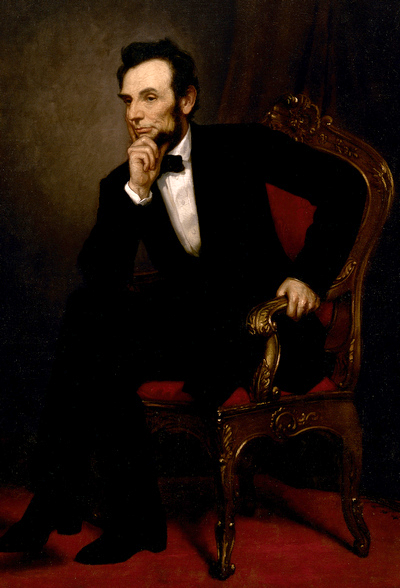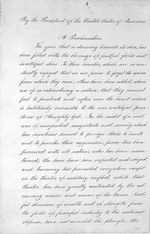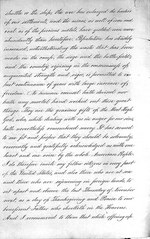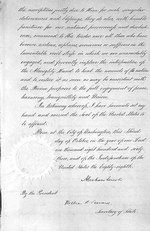What did Abraham Lincoln’s say in his pivotal 1863 Presidential proclamation of American thanksgiving to God?

This proclamation of thanks to God took place shortly after President Abraham Lincoln committed his life to Jesus Christ, and while America was at the height of the American Civil War, in its bloodiest year. As a man of high integrity, honesty1 and good character, Lincoln recognized that ultimately every good thing comes from God, and even amidst this lamentable strife, Almighty God had bountifully blessed the people of America in many vital ways—both in the North and South. Lincoln foresaw the day was coming when America would again be united and that it would experience a “large increase of freedom.” Lincoln urged all to thank God and celebrate His gracious and merciful blessings with “one heart and one voice, by the whole American people.” His message was profoundly hopeful, humble, thankful; he desired to inspire all Americans to live righteously and do good works. Lincoln knew that expressing genuine gratitude to God brings humility and healing.
It was this pivotal proclamation by Lincoln which eventually led to the establishment of an official, annual U.S. national Thanksgiving Day. The purpose of Web page is not to praise Lincoln, but to praise the attitude he so well expressed.


by the President of the United States of America
“The year that is drawing toward its close has been filled with the blessings of fruitful years and healthful skies. To these bounties, which are so constantly enjoyed that we are prone to forget the Source from which they come, others have been added which are of so extraordinary a nature that they can not fail to penetrate and soften even the heart which is habitually insensible to the ever-watchful providence of Almighty God.
In the midst of a civil war of unequaled magnitude and severity, which has sometimes seemed to foreign states to invite and to provoke their aggression, peace has been preserved with all nations, order has been maintained, the laws have been respected and obeyed, and harmony has prevailed everywhere, except in the theater of military conflict, while that theater has been greatly contracted by the advancing armies and navies of the Union.
Needful diversions of wealth and of strength from the field of peaceful industry to the national defense have not arrested the plow, the shuttle, or the ship; the ax has enlarged the borders of our settlements, and the mines, as well of iron and coal as of the precious metals, have yielded even more abundantly than theretofore. Population has steadily increased notwithstanding the waste that has been made in the camp, the siege, and the battlefield, and the country, rejoicing in the consciousness of augmented strength and vigor, is permitted to expect continuance of years with large increase of freedom.
No human counsel hath devised nor hath any mortal hand worked out these great things. They are the gracious gifts of the Most High God, who, while dealing with us in anger for our sins, hath nevertheless remembered mercy.
It has seemed to me fit and proper that they should be solemnly, reverently, and gratefully acknowledged, as with one heart and one voice, by the whole American people. I do therefore invite my fellow-citizens in every part of the United States, and also those who are at sea and those who are sojourning in foreign lands, to set apart and observe the last Thursday of November next as a day of thanksgiving and praise to our beneficent Father who dwelleth in the heavens. And I recommend to them that while offering up the ascriptions justly due to Him for such singular deliverances and blessings they do also, with humble penitence for our national perverseness and disobedience, commend to His tender care all those who have become widows, orphans, mourners, or sufferers in the lamentable civil strife in which we are unavoidably engaged, and fervently implore the interposition of the Almighty Hand to heal the wounds of the nation and to restore it, as soon as may be consistent with the Divine purposes, to the full enjoyment of peace, harmony, tranquility, and union.
In testimony whereof I have hereunto set my hand and caused the seal of the United States to be affixed.
Done at the City of Washington, this Third day of October, in the year of our Lord one thousand eight hundred and sixty-three, and of the Independence of the United States the Eighty-eighth.”
By the President: 
View the actual October 3, 1863 3-page document below…



Six months earlier, Lincoln had proclaimed a national day of humility, repentant prayer and fasting.2
Notes
Abraham Lincoln’s nickname was “Honest Abe.” Honesty and integrity were extremely important to him. For example, his strong advice to aspiring attorneys was: “Resolve to be honest at all events; and if in your own judgment you cannot be an honest lawyer, resolve to be honest without being a lawyer.” Abraham Lincoln Complete Works, John D. Nicolay and John Hay, editors (New York: The Century Co., 1894), Vol. 1, p. 164, “Notes for Law Lecture,” dated July 1, 1850. Also, The Collected Works of Abraham Lincoln edited by Roy P. Basler, Volume II, “Notes for a Law Lecture” (July 1, 1850), p. 82.
-
On April 24, 1863, President Lincoln issued a proclamation of a national day of humility, prayer and fasting, saying,
“…it is the duty of nations, as well as of men, to own their dependence upon the overruling power of God, to confess their sins and transgressions, in humble sorrow, yet with assured hope that genuine repentance will lead to mercy and pardon, and to recognize the sublime truths announced in the Holy Scriptures, and proven by all history, that those nations only are blessed whose God is the Lord;
And, inasmuch as we know that, by his divine law, nations, like individuals, are subjected to punishments and chastisements in this world, may we not justly fear that the awful calamity of civil war which now desolates the land, may be but a punishment inflicted upon us for our presumptuous sins, to the needful end of our national reformation as a whole people?
We have been the recipients of the choicest bounties of Heaven. We have been preserved, these many years, in peace and prosperity. We have grown in numbers, wealth and power, as no other nation has ever grown. But we have forgotten God, we have forgotten the gracious hand which preserved us in peace, and multiplied and enriched and strengthened us; and we have vainly imagined, in deceitfulness of our hearts, that all these blessings were produced by some superior wisdom and virtue of our own. Intoxicated with unbroken success, we have become too self sufficient to feel the necessity of redeeming and preserving grace, too proud to pray to the God that made us!
It behooves us, then, to humble ourselves before the offended Power, to confess our national sins, and to pray for clemency and forgiveness.
Now, therefore, in compliance with the request, and fully concurring in the views of the Senate, I do by this proclamation, designate and set apart Thursday, the 30th day of April, 1863, as a day of national humiliation, fasting and prayer. And I do hereby request all people to abstain from their ordinary secular pursuits, and to unite, at their several places of public worship and their respective homes, in keeping the day holy to the Lord, and devoted to the humble discharge of the religious duties proper to that solemn occasion.
All this being done in sincerity and truth, let us then rest humbly in the hope, authorized by the Divine teachings, that the united cry of the Nation will be heard on high and answered with blessings, no less than the pardon of our national sins, and restoration of our now divided and suffering country to its former happy condition of unity and peace.”
In Lincoln’s 2nd Inaugural Address (March 4, 1865), he affirmed that “the judgments of the Lord are true and righteous altogether” (Psalm 19:9 KJV). He ended with the memorable words,
“With malice toward none, with charity for all, with firmness in the right as God gives us to see the right, let us strive on to finish the work we are in, to bind up the nation’s wounds, to care for him who shall have borne the battle and for his widow and his orphan, to do all which may achieve and cherish a just and lasting peace among ourselves and with all nations.”
Related questions
What is the origin of America’s annual Thanksgiving Day? Answer
THANKSGIVING HOLIDAY—Why do Americans celebrate it? Answer
Are YOU thankful to God? See what the Bible has to say about thanksgiving. Post your thanks to encourage others. —GO
What should we thank God for, and how should we praise Him? Answer
THANKFULNESS—Tips for New and Growing Christians —GO
